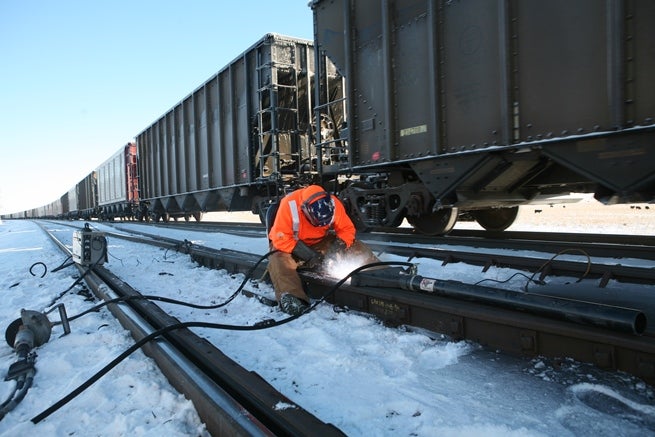Uncategorized
Rail Conference Unions Urge Changes to Prevent Accidents

The unions represented under the Teamsters Rail Conference have different, but connected, viewpoints on how to improve rail safety. The Brotherhood of Locomotive Engineers and Trainmen (BLET) represents the operating crew of trains while the Brotherhood of Maintenance of Way (BMWED) represents the maintenance and construction workers who build rail tracks and bridges.
Recently there has been a significant increase in rail accidents involving crude oil tank cars and the BMWED is urging Congress to take steps to require rail companies to invest in track improvements. The threat of rail operating crews being reduced to a single person has been a priority for rail corporations for some years, but the BLET has always fought back and a federal court took their side when they struck over the issue.
“The key to reducing oil train derailments plaguing North America is improved track maintenance,” said Freddie N. Simpson, International Vice President and President of the BMWED. “BMWED members have the knowhow and the skills to maintain the tracks to a higher safety standard; however, the railroad companies solely determine the amount of resources invested in track maintenance.”
Track conditions are a leading cause of train derailments in the United States, accounting for approximately one-third of all train accidents, according to data published by the Federal Railroad Administration (FRA). Transporting crude oil on U.S. railroads grew from just 9,500 carloads in 2008 to more than 400,000 carloads in 2013. The wear and tear on the track structure, coupled with the volatility of the commodities being transported, requires additional track maintenance to stay ahead of the rate of track degradation.
“For the sake of rail workers and the American public, BMWED/Teamsters will continue to push track quality and improved track maintenance as the foundation of railroad and oil train safety,” Simpson said.
Keeping at least two people on the crew running a locomotive engine has been a safety and legislative priority for the BLET for many years. Yet, rail corporations seem dead-set against this practical rule, pushing instead for one-person crews and claiming that the savings in salary payments justifies the change. Recently, though, the BLET was awarded a victory over a strike by their members when a rail corporation started replacing union crews.
Strike Has Repercussions
In a major legal victory to protect two-person train crews, a court sided with the BLET’s position that the Wheeling & Lake Erie’s (W&LE) use of managers in place of union conductors is a major dispute under the Railway Labor Act. The ruling vindicates BLET’s decision to strike over the issue more than 18 months ago.
“The favorable ruling from the U.S. Court of Appeals for the Sixth Circuit constitutes a major victory for all BLET members, especially our brothers and sisters at the W&LE,” said BLET President Dennis Pierce. “They have fought the good fight for many years now and have stood strong against management’s wishes to implement one-person train operations. Our members deserve our thanks for holding the line on this important safety issue.”
Contract negotiations at the railroad have been stalled for years as the railroad apparently seeks to eliminate crew members and force one-person train operations.
The BLET has long opposed such freight operations as being adverse to worker and public safety.